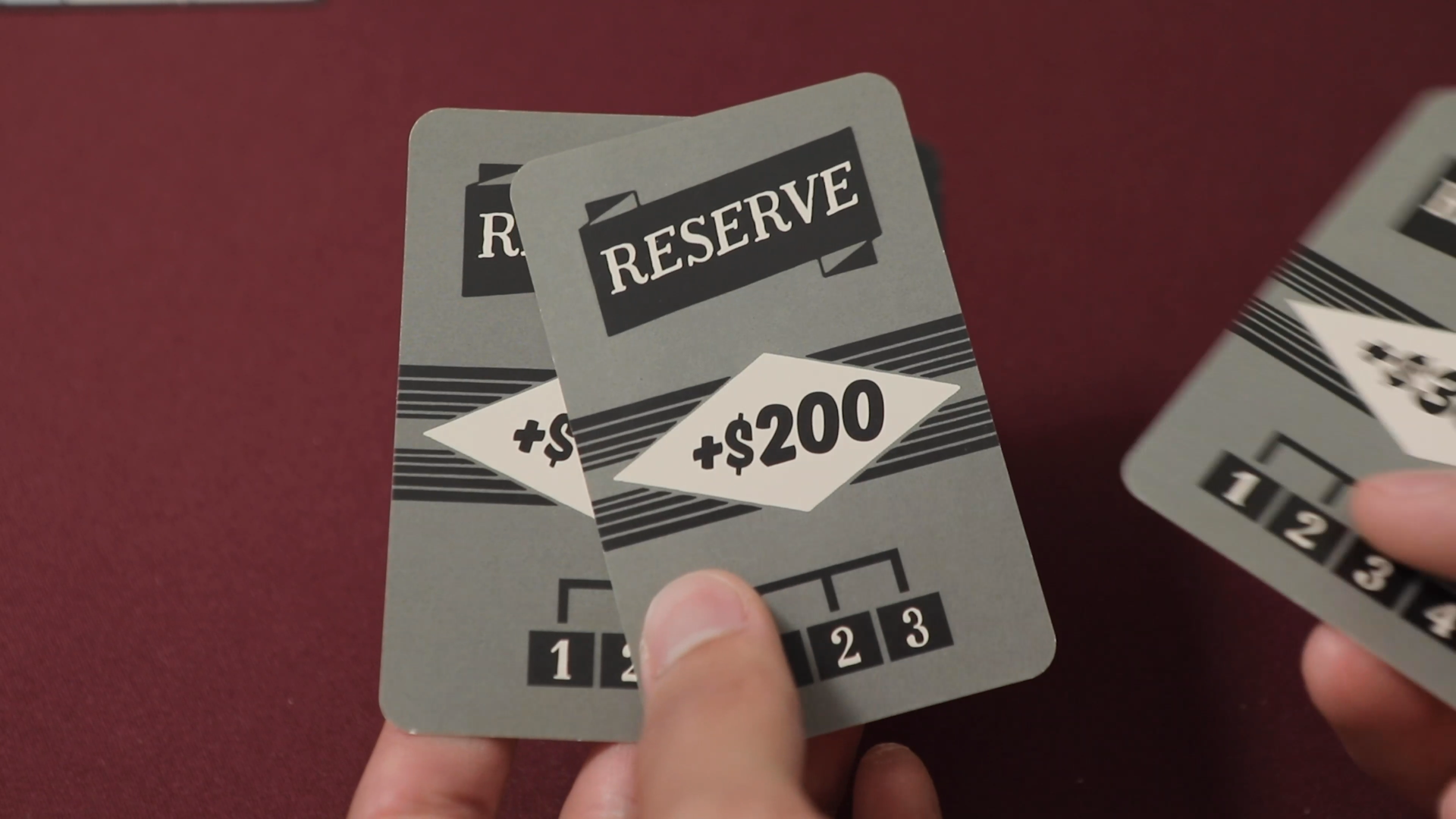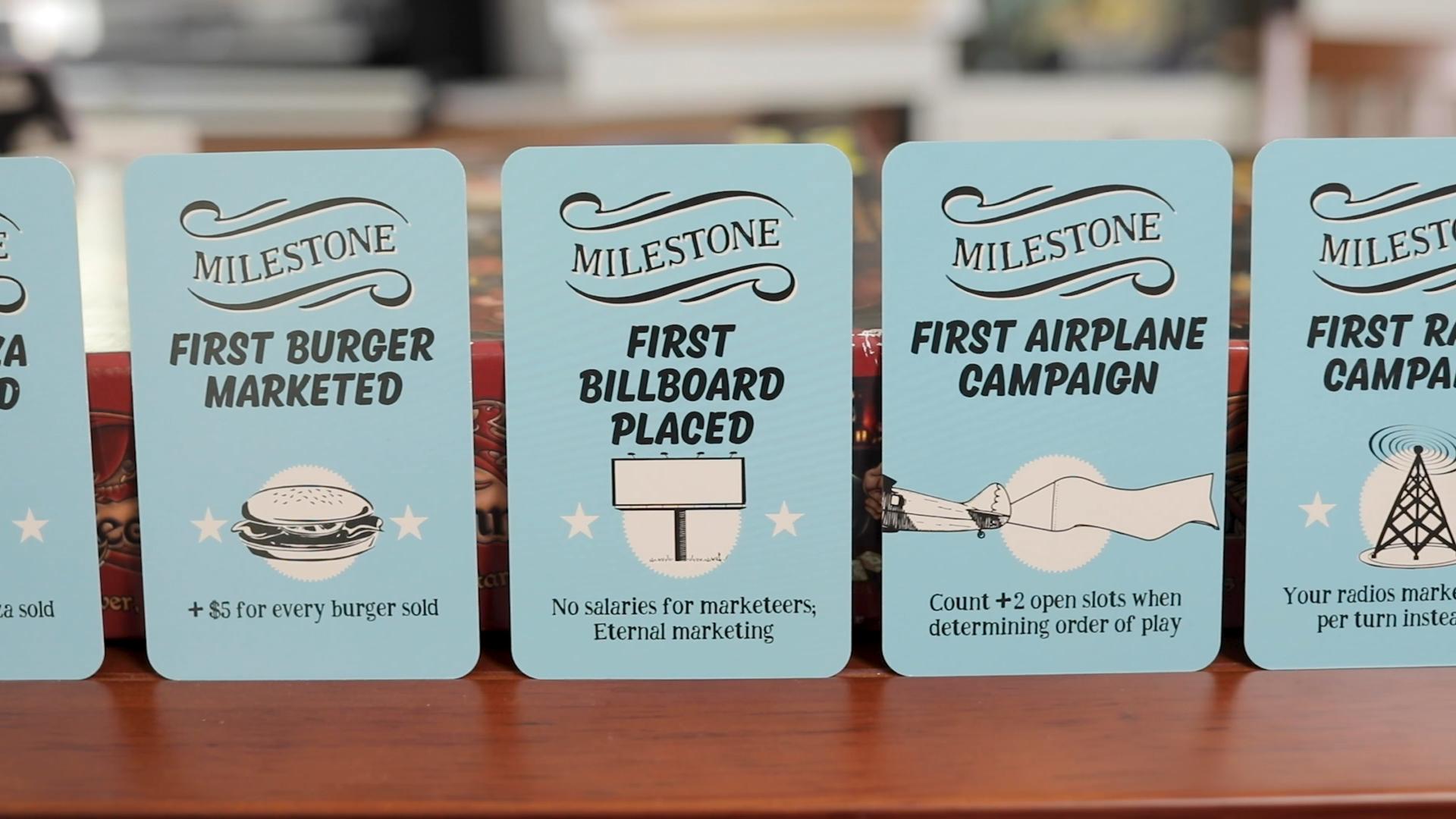Food Chain Magnate Review
Gameplay is the exact opposite of actual fast food, rather it’s a carefully crafted dine-in with so many layers.
To sell the most fast food to hungry Americans, embark on a zero-sum, cutthroat business venture for 3-5 players, in multiple hours.
Video published July 17th, 2020

You won't be a lone CEO for long as your business expands.

Sell 5 different types of food & drinks to your customers... just make sure they're made hungry first.

A variable time length keeps CEOs on their toes for game end.
Overview & How to Play
In a world without McDonald’s or Wendy’s… you are a fast food company CEO! Get as much cash as possible to win Food Chain Magnate!
To do that, your fast food company is going to be marketing products, then producing those products, then selling to hungry customers on the house come the end of each round. The core of this is done through hiring employees, where each employee will have a certain ability. For instance, Burger Chefs cook burgers, and Marketing Trainees can erect billboards to build demand for these burgers.
In a gameplay sense, every round just has each player hiring employees, then choosing which employees to use that round, then activating those employees’ abilities, and finally going to the dinnertime end-of-round where goods (unhealthy food/drink) are sold to houses on the map. Simply put for selling, the closer a restaurant is to the customers’ houses on the map, combined with the lowest price, the better they do in convincing that hungry American to buy from them.
This gameplay loop of hiring, then selling, repeats until the bank runs out of money for a second, yes a second time. Then, FCM ends, and whoever has the most cash wins.
Pros
Food Chain Magnate’s components are generally as quality as its gameplay. The quality of the hundreds of cards you get are amazing, feeling super dense and will last the test of time. And the wooden pieces for food are as proportionally chunky and stack really well when needed. Oh, and the game doesn’t just give you player aids, no, they’re restaurant menus which feel great to sift through, and explain everything about the game.
They’ll prominently display all of the game’s milestones, which are essentially permanent technologies that you can unlock, which starts foreshadowing the grand amount of varied strategy that emerges in this game. There’s discounts to paying salaries, a refrigerator to store food, or even infinite marketing campaigns. Infinite!
The heart and soul of Food Chain Magnate’s turns are the employees… because what is any business without good workers right? Besides hiring grunts to cook food, like Burger or Pizza Cooks, you can hire Luxuries Managers to RAISE the price of food, or there’s conversely Discount Managers to undercut other restaurants’ prices.
Marketing is another awesome mechanic, where your employees are literally creating demand for your products across the board. And there’s so many different shapes and sizes of marketing tiles that’s combined with 4 different marketing methodologies. You can market with an airplane banner to a thick row of houses, or you could just plant a radio station that blasts your marketing to 9 tiles. And the speed of marketing matters a lot in this game, with radios yelling “EAT BURGERS” going to first get into people’s heads. Eventually, faster, more elite marketing campaigns will dominate late game. so houses can get quickly capped in demand of what they’ll eat as the game progresses, since faster, more elite marketing dominates late game. Employees’ marketing campaigns will also end eventually, meaning that you can constantly pivot to new strategies.
Why may you need to pivot? Because, see, when you market, those darn customers won’t be loyal to your restaurants’ products, they’ll eat anyone’s. So if you’re not careful, you could just end up marketing products and your corporate enemies could be selling to your marketed houses and getting all of the profits.
With these crazy abilities mixed with the milestones, after the first couple of turns you’ll be constantly using your employees and milestones to adapt to your evolving opponents’ abilities from their employees and milestones. The game can become a brutal duel of price slashing with lots of goods to sell, or with players pivoting to new products to keep margins high. It’s up to the players whether these happen.
And you’re allowed to adapt really well because of the perfect information that feels very fair. You can almost always see what other people are doing as you constantly try to outwit each other. And the milestone cards count for everyone achieving that goal in a round, so it never feels unfair that someone has a cool ability and you don’t, especially early game where you don’t have much control over turn order. If you REALLY want a cool tech in this game, you can typically find that you can get it.
The progression of this game overall just feels so incredibly fitting, as your business builds up, with maybe different chains across the neighborhood, tons of salaries to pay with tons of production, and you can even place NEW houses on the map, meaning MORE customers!
Some of the best moments of Food Chain Magnate are when you stop and ask yourself, how is this business actually being run?
It feels realistic in some aspects, as players are creating demand that is satiated as you hire Cooks and Cart Operators to acquire product. You’re managing your company’s cash flow as you may pay employee salaries, and engaging in a price war with the two restaurants down the street. So that seems all realistic and sensible.
Wait, but then suddenly one game you’re yelling at your Errand Boys to grab you some beer, because your Marketing Trainee just erected a billboard telling everyone that being an alcoholic is cool. Oh shoot, what the heck, Gluttony Inc. Burgers just hired a Regional Manager and just teleported his restaurant next door to outsell me on pizza!
Back at corporate, your Management Trainee children all report to your CEO, but then under your Trainees are your Gurus, HR Directors, and Zeppelin Pilots.
Cons
But man, Food Chain hits HARD with the first con, the terrible space management. It needs a LOT of space to play, with everyone’s growing management tree with 3-4 players easily not fitting on a 3 foot by 5 foot table. So then you have to use side tables or chairs. This is such a big deal for gameplay, because you’ll lose clarity of other’s capabilities during gameplay, because opponents’ employees and milestones are the key things you need to play around.
This box also doesn’t come with any insert for the pieces, and will absolutely require some type of homebrew solution to store all of the attainable employees and milestones, lest it take up even more space on your table.
Final Thoughts
To finish eating this delicious burger, there’s not really any other game out there with FCM’s clever management structure and marketing system, so combine that with the permanent milestones, employee training diversity, and amazing replayability in map layouts, and we have ourselves a heavy classic, especially if you’re ok with the punishing, zero-sum nature of the cash flow of ONE person gaining sales. Its a fantastic game mechanically for the competitive fast food chain experience it’s trying to be… but then it doesn’t do a good job of being a board game. Expect lots of components modding, and downtime as players attempt to calculate each other’s businesses to squeeze out the most money during dinnertime.

















